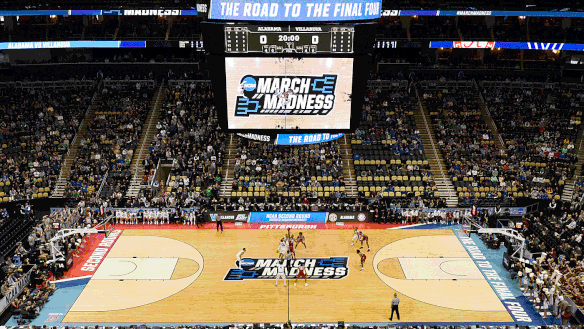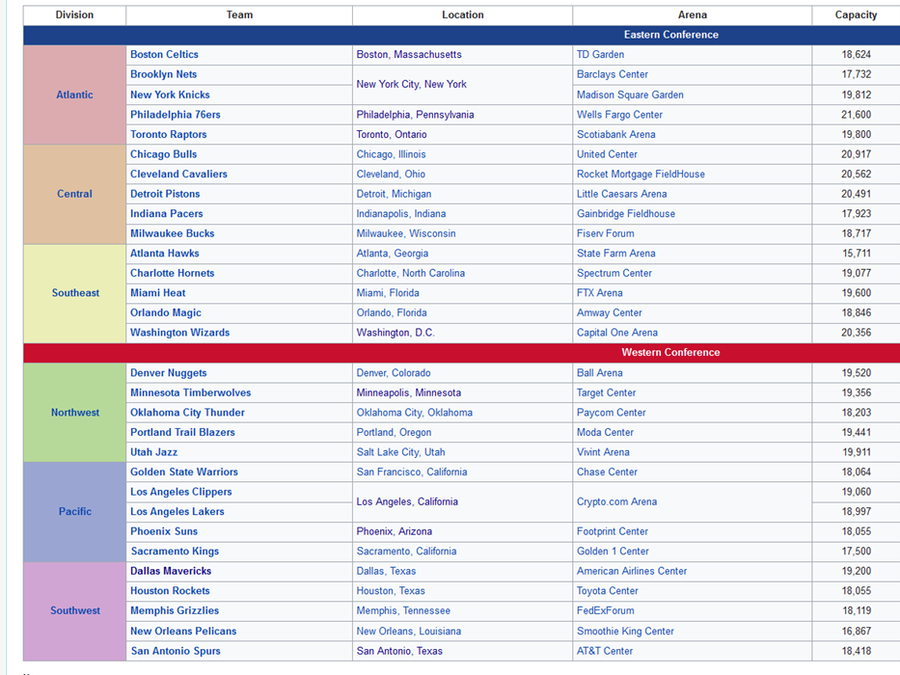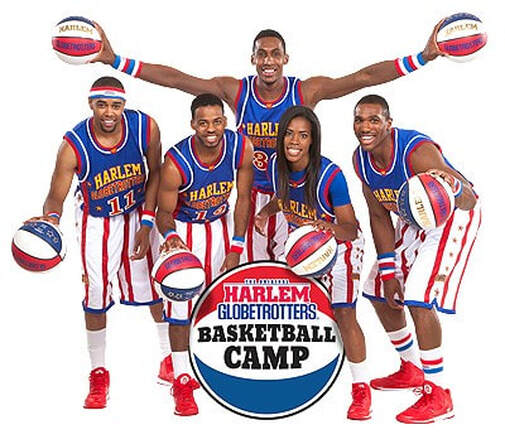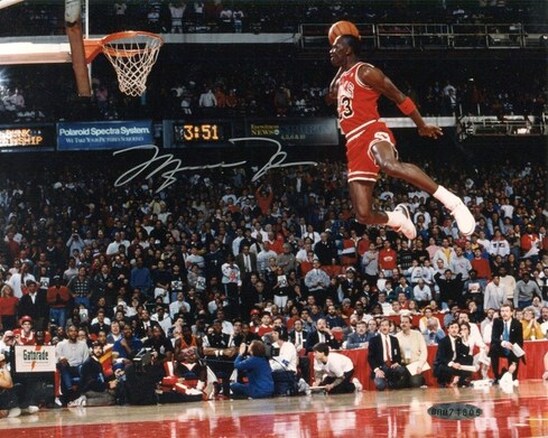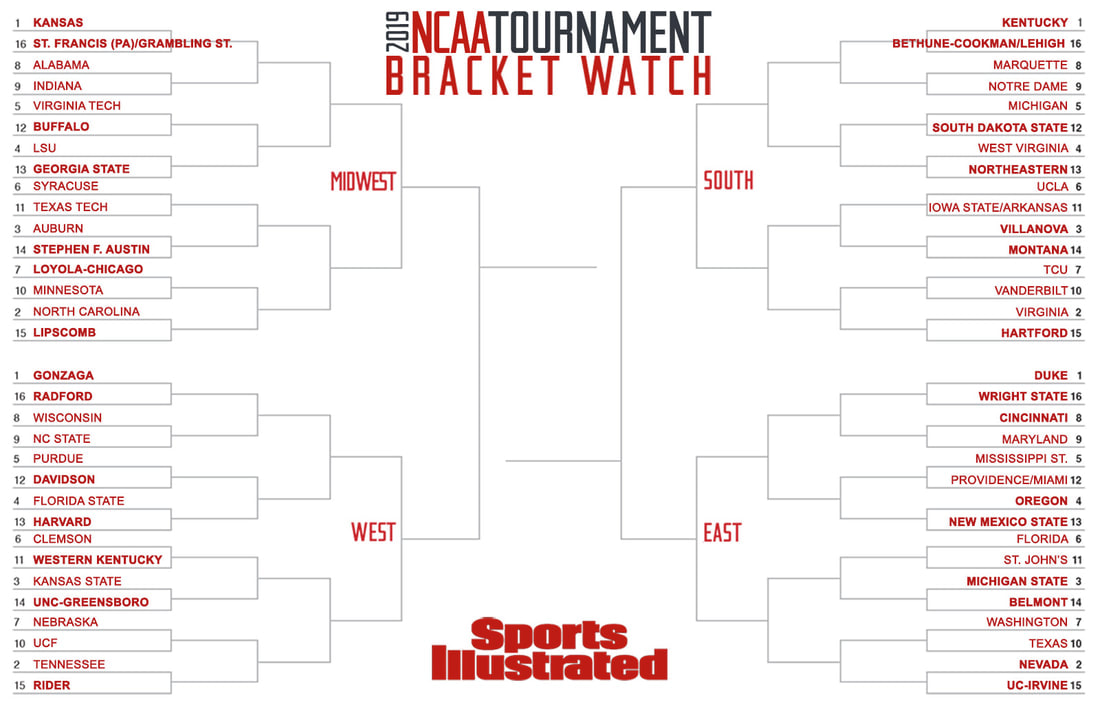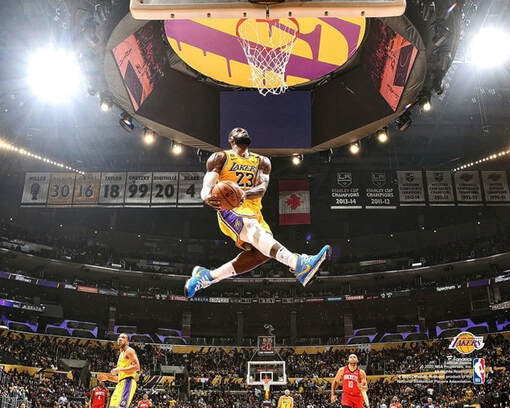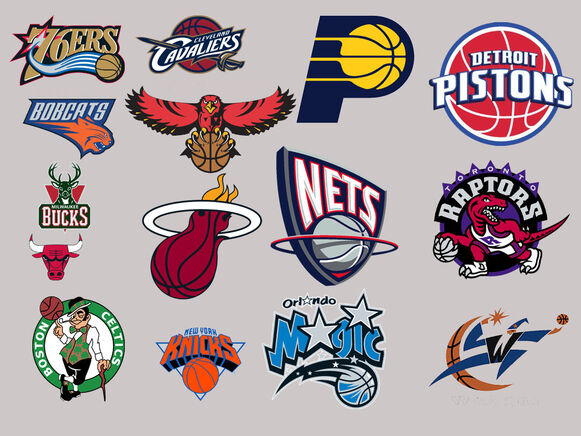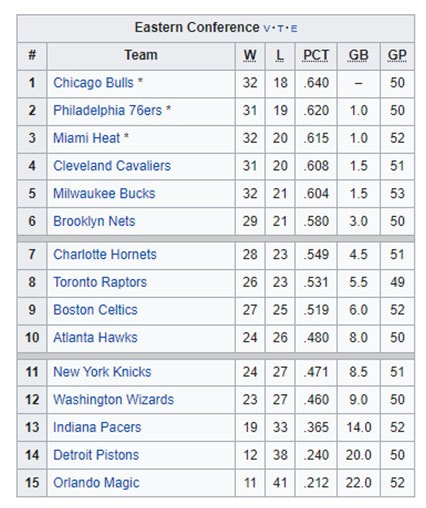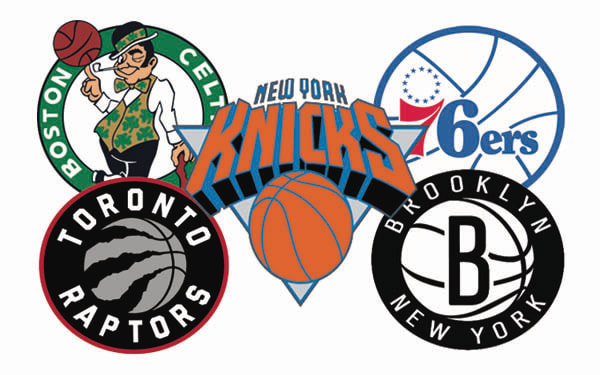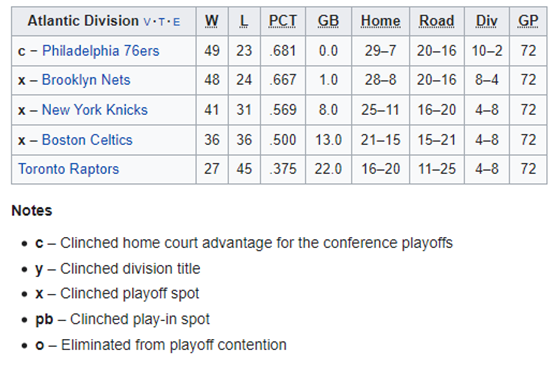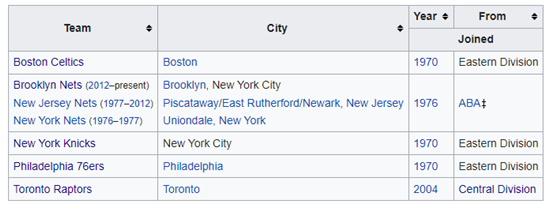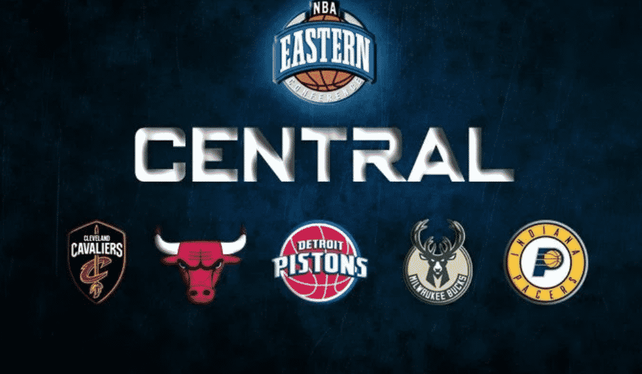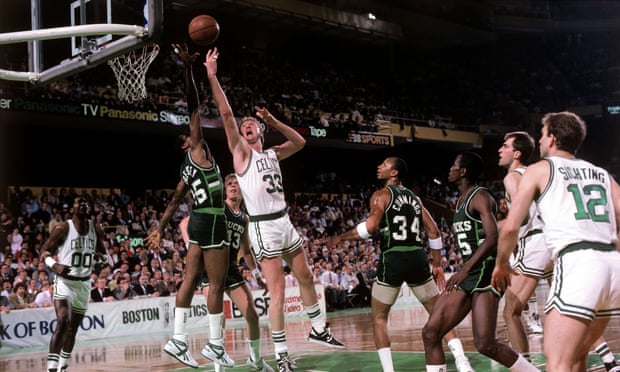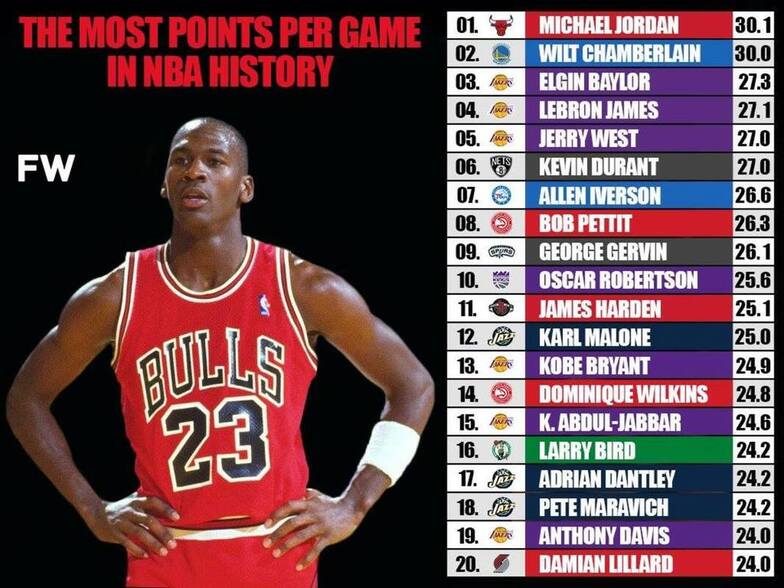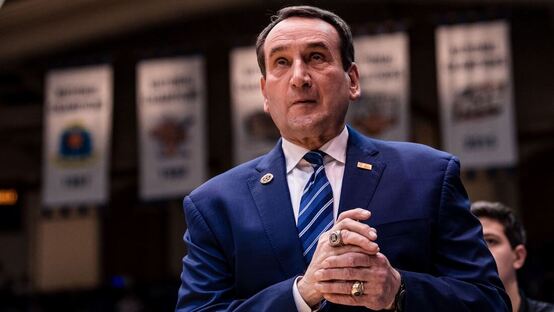Copyright © 2015 Bert N. Langford (Images may be subject to copyright. Please send feedback)
Welcome to Our Generation USA!
This Web Page covers
Basketball,
featuring the National Basketball Association (NBA)
Basketball
- YouTube Video of the Most Amazing Plays In NBA History
- YouTube Video: DUNK_DEFYING Spud Webb and Nate Robinson
- YouTube Video: NBA's Top 100 Plays Of The Decade
Basketball is a team sport in which two teams, most commonly of five players each, opposing one another on a rectangular court, compete with the primary objective of shooting a basketball (approximately 9.4 inches (24 cm) in diameter) through the defender's hoop (a basket 18 inches (46 cm) in diameter mounted 10 feet (3.048 m) high to a backboard at each end of the court) while preventing the opposing team from shooting through their own hoop.
A field goal is worth two points, unless made from behind the three-point line, when it is worth three. After a foul, timed play stops and the player fouled or designated to shoot a technical foul is given one or more one-point free throws. The team with the most points at the end of the game wins, but if regulation play expires with the score tied, an additional period of play (overtime) is mandated.
Players advance the ball by bouncing it while walking or running (dribbling) or by passing it to a teammate, both of which require considerable skill. On offense, players may use a variety of shots—the lay-up, the jump shot, or a dunk; on defense, they may steal the ball from a dribbler, intercept passes, or block shots; either offense or defense may collect a rebound, that is, a missed shot that bounces from rim or backboard. It is a violation to lift or drag one's pivot foot without dribbling the ball, to carry it, or to hold the ball with both hands then resume dribbling.
The five players on each side fall into five playing positions the tallest player is usually the center, the tallest and strongest is the power forward, a slightly shorter but more agile player is the small forward, and the shortest players or the best ball handlers are the shooting guard and the point guard, who implements the coach's game plan by managing the execution of offensive and defensive plays (player positioning). Informally, players may play three-on-three, two-on-two, and one-on-one.
Invented in 1891 by Canadian-American gym teacher James Naismith in Springfield, Massachusetts, United States, basketball has evolved to become one of the world's most popular and widely viewed sports.
The National Basketball Association (NBA) is the most significant professional basketball league in the world in terms of popularity, salaries, talent, and level of competition.
Outside North America, the top clubs from national leagues qualify to continental championships such as the EuroLeague and the Basketball Champions League Americas.
The FIBA Basketball World Cup and Men's Olympic Basketball Tournament are the major international events of the sport and attract top national teams from around the world. Each continent hosts regional competitions for national teams, like EuroBasket and FIBA AmeriCup.
The FIBA Women's Basketball World Cup and Women's Olympic Basketball Tournament feature top national teams from continental championships. The main North American league is the WNBA (NCAA Women's Division I Basketball Championship is also popular), whereas strongest European clubs participate in the EuroLeague Women.
Click on any of the following blue hyperlink for more about Basketball:
A field goal is worth two points, unless made from behind the three-point line, when it is worth three. After a foul, timed play stops and the player fouled or designated to shoot a technical foul is given one or more one-point free throws. The team with the most points at the end of the game wins, but if regulation play expires with the score tied, an additional period of play (overtime) is mandated.
Players advance the ball by bouncing it while walking or running (dribbling) or by passing it to a teammate, both of which require considerable skill. On offense, players may use a variety of shots—the lay-up, the jump shot, or a dunk; on defense, they may steal the ball from a dribbler, intercept passes, or block shots; either offense or defense may collect a rebound, that is, a missed shot that bounces from rim or backboard. It is a violation to lift or drag one's pivot foot without dribbling the ball, to carry it, or to hold the ball with both hands then resume dribbling.
The five players on each side fall into five playing positions the tallest player is usually the center, the tallest and strongest is the power forward, a slightly shorter but more agile player is the small forward, and the shortest players or the best ball handlers are the shooting guard and the point guard, who implements the coach's game plan by managing the execution of offensive and defensive plays (player positioning). Informally, players may play three-on-three, two-on-two, and one-on-one.
Invented in 1891 by Canadian-American gym teacher James Naismith in Springfield, Massachusetts, United States, basketball has evolved to become one of the world's most popular and widely viewed sports.
The National Basketball Association (NBA) is the most significant professional basketball league in the world in terms of popularity, salaries, talent, and level of competition.
Outside North America, the top clubs from national leagues qualify to continental championships such as the EuroLeague and the Basketball Champions League Americas.
The FIBA Basketball World Cup and Men's Olympic Basketball Tournament are the major international events of the sport and attract top national teams from around the world. Each continent hosts regional competitions for national teams, like EuroBasket and FIBA AmeriCup.
The FIBA Women's Basketball World Cup and Women's Olympic Basketball Tournament feature top national teams from continental championships. The main North American league is the WNBA (NCAA Women's Division I Basketball Championship is also popular), whereas strongest European clubs participate in the EuroLeague Women.
Click on any of the following blue hyperlink for more about Basketball:
- History
- Rules and regulations
- Common techniques and practices
- Height
- Variations and similar games
- Social forms of basketball
- Fantasy basketball
- See also:
- Main article: Outline of basketball
- Basketball at the Summer Olympics
- Basketball in Africa
- Basketball in the Philippines
- Basketball in the United States
- Basketball moves
- Basketball National League
- Continental Basketball Association
- Glossary of basketball
- Hot hand fallacy
- National Basketball Association
- Timeline of women's basketball
- ULEB Union des Ligues Européennes de Basket, in English Union of European Leagues of Basketball
- Free Basket, basketball related sculpture in Indianapolis
- Basketball in Lithuania
- Historical:
- Basketball Hall of Fame – Springfield, MA
- National Basketball Foundation—runs the Naismith Museum in Ontario
- Hometown Sports Heroes
- Organizations:
- Other Sources:
National Basketball Association (NBA) including the NBA Hall of FamePictured: Listing of NBA Teams as TOP= Eastern Conference; BOTTOM: Western Conference
Click here the Naismith Memorial Basketball Hall of Fame including Inductees.
The National Basketball Association (NBA) is the pre-eminent men's professional basketball league in North America, and is widely considered to be the premier men's professional basketball league in the world.
It has 30 teams (29 in the United States and 1 in Canada), and is an active member of USA Basketball (USAB), which is recognized by FIBA (also known as the International Basketball Federation) as the national governing body for basketball in the United States.
The NBA is one of the four major professional sports leagues in the United States and Canada. NBA players are the world's best paid sportsmen, by average annual salary per player.
The league was founded in New York City on June 6, 1946, as the Basketball Association of America (BAA). The league adopted the name National Basketball Association on August 3, 1949, after merging with its rival National Basketball League (NBL).
The league's several international as well as individual team offices are directed out of its head offices located in the Olympic Tower at 645 Fifth Avenue in New York City. NBA Entertainment and NBA TV studios are directed out of offices located in Secaucus, New Jersey.
Click on any of the following blue hyperlinks for amplification:
The National Basketball Association (NBA) is the pre-eminent men's professional basketball league in North America, and is widely considered to be the premier men's professional basketball league in the world.
It has 30 teams (29 in the United States and 1 in Canada), and is an active member of USA Basketball (USAB), which is recognized by FIBA (also known as the International Basketball Federation) as the national governing body for basketball in the United States.
The NBA is one of the four major professional sports leagues in the United States and Canada. NBA players are the world's best paid sportsmen, by average annual salary per player.
The league was founded in New York City on June 6, 1946, as the Basketball Association of America (BAA). The league adopted the name National Basketball Association on August 3, 1949, after merging with its rival National Basketball League (NBL).
The league's several international as well as individual team offices are directed out of its head offices located in the Olympic Tower at 645 Fifth Avenue in New York City. NBA Entertainment and NBA TV studios are directed out of offices located in Secaucus, New Jersey.
Click on any of the following blue hyperlinks for amplification:
- History:
- Teams
- Regular season
- Playoffs
- League championships
- International competitions
- Ticket prices and viewership demographics
- Notable people
- Presidents and commissioners
- Players
- Foreign players: International influence
- Coaches
- See also:
- List of American and Canadian cities by number of major professional sports franchises
- List of attendance figures at domestic professional sports leagues
- List of NBA champions
- List of National Basketball Association awards
- List of National Basketball Association career scoring leaders
- List of professional sports teams in the United States and Canada
- List of TV markets and major sports teams in the United States
- Major professional sports leagues in the United States and Canada
- National Basketball Association Cheerleading
- National Basketball Association Nielsen ratings
- National Basketball Association rivalries
- NBA Salary Cap
- List of NBA Playoffs Series
- NBA Summer League
- National Basketball Association Development League (NBA D-League)
- Women's National Basketball Association (WNBA)
The NCAA Men's Division I Basketball Tournament is a single-elimination tournament played each spring in the United States, currently featuring 68 college basketball teams from the Division I level of the National Collegiate Athletic Association (NCAA), to determine the national championship.
The tournament was created in 1939 by the National Association of Basketball Coaches, and was the idea of Ohio State University coach Harold Olsen. Played mostly during March, it is known informally as March Madness or the Big Dance, and has become one of the most famous annual sporting events in the United States. The NCAA has credited Bob Walsh of the Seattle Organizing Committee for starting the March Madness celebration during 1984.
The tournament teams include champions from 32 Division I conferences (which receive automatic bids), and 36 teams which are awarded at-large berths. These "at-large" teams are chosen by an NCAA selection committee, then announced in a nationally televised event on the Sunday preceding the First Four play-in games, currently held in Dayton, Ohio, and dubbed Selection Sunday.
The 68 teams are divided into four regions and organized into a single elimination "bracket", which pre-determines, when a team wins a game, which team it will face next. Each team is "seeded", or ranked, within its region from 1 to 16.
After an initial four games between eight lower-ranked teams, the tournament occurs during the course of three weekends, at pre-selected neutral sites across the United States. Teams, seeded by rank, proceed through a single game elimination bracket beginning with a first round consisting of 64 teams, to a "Sweet Sixteen", and for the last weekend of the tournament, a Final Four. The Final Four is usually played during the first weekend of April.
These four teams, one from each region (East, South, Midwest, and West), compete in one centralized location for the national championship.
The tournament has been at least partially televised since 1969. Currently, the games are broadcast by CBS, TBS, TNT, and truTV by the trade-name NCAA March Madness. Since 2011, all games are available for viewing nationwide and internationally, such as in the Philippines and Canada. As television coverage has grown, so too has the tournament's popularity. Currently, millions of Americans fill out a bracket, attempting to correctly predict the outcome of all 67 games of the tournament.
With 11 national titles, UCLA has the record for the most NCAA Men's Division I Basketball Championships; John Wooden coached UCLA to 10 of its 11 titles.
The University of Kentucky is second, with eight national titles, while the University of North Carolina, Duke University, and Indiana University are tied for third with five national titles.
The University of Connecticut is sixth with four national titles. After that the University of Kansas and University of Louisville are tied with three championships.
Since 1985, when the tournament went to 64 teams, Duke has won five championships; Connecticut has four; Kentucky and North Carolina have three; and Kansas, Louisville, Florida and Villanova have two; UCLA, Indiana, Arkansas, Maryland, Syracuse, and Michigan State have one. Also Michigan, UNLV, Arkansas, Arizona, Maryland, and Syracuse all won their first championship (as did Duke, Connecticut, and Florida).
Click here for further amplification.
The tournament was created in 1939 by the National Association of Basketball Coaches, and was the idea of Ohio State University coach Harold Olsen. Played mostly during March, it is known informally as March Madness or the Big Dance, and has become one of the most famous annual sporting events in the United States. The NCAA has credited Bob Walsh of the Seattle Organizing Committee for starting the March Madness celebration during 1984.
The tournament teams include champions from 32 Division I conferences (which receive automatic bids), and 36 teams which are awarded at-large berths. These "at-large" teams are chosen by an NCAA selection committee, then announced in a nationally televised event on the Sunday preceding the First Four play-in games, currently held in Dayton, Ohio, and dubbed Selection Sunday.
The 68 teams are divided into four regions and organized into a single elimination "bracket", which pre-determines, when a team wins a game, which team it will face next. Each team is "seeded", or ranked, within its region from 1 to 16.
After an initial four games between eight lower-ranked teams, the tournament occurs during the course of three weekends, at pre-selected neutral sites across the United States. Teams, seeded by rank, proceed through a single game elimination bracket beginning with a first round consisting of 64 teams, to a "Sweet Sixteen", and for the last weekend of the tournament, a Final Four. The Final Four is usually played during the first weekend of April.
These four teams, one from each region (East, South, Midwest, and West), compete in one centralized location for the national championship.
The tournament has been at least partially televised since 1969. Currently, the games are broadcast by CBS, TBS, TNT, and truTV by the trade-name NCAA March Madness. Since 2011, all games are available for viewing nationwide and internationally, such as in the Philippines and Canada. As television coverage has grown, so too has the tournament's popularity. Currently, millions of Americans fill out a bracket, attempting to correctly predict the outcome of all 67 games of the tournament.
With 11 national titles, UCLA has the record for the most NCAA Men's Division I Basketball Championships; John Wooden coached UCLA to 10 of its 11 titles.
The University of Kentucky is second, with eight national titles, while the University of North Carolina, Duke University, and Indiana University are tied for third with five national titles.
The University of Connecticut is sixth with four national titles. After that the University of Kansas and University of Louisville are tied with three championships.
Since 1985, when the tournament went to 64 teams, Duke has won five championships; Connecticut has four; Kentucky and North Carolina have three; and Kansas, Louisville, Florida and Villanova have two; UCLA, Indiana, Arkansas, Maryland, Syracuse, and Michigan State have one. Also Michigan, UNLV, Arkansas, Arizona, Maryland, and Syracuse all won their first championship (as did Duke, Connecticut, and Florida).
Click here for further amplification.
The Harlem Globetrotters are an exhibition basketball team that combines athleticism, theater, and comedy. Over the years they have played more than 26,000 exhibition games in 122 countries and territories.
The team's signature song is Brother Bones's whistled version of "Sweet Georgia Brown". Their mascot is an anthropomorphized globe named Globie.
The team plays over 450 live events worldwide each year. The team is currently owned by Herschend Family Entertainment. The executive offices for the team are located in suburban Atlanta.
Click on any of the following blue hyperlinks for further amplification:
The team's signature song is Brother Bones's whistled version of "Sweet Georgia Brown". Their mascot is an anthropomorphized globe named Globie.
The team plays over 450 live events worldwide each year. The team is currently owned by Herschend Family Entertainment. The executive offices for the team are located in suburban Atlanta.
Click on any of the following blue hyperlinks for further amplification:
[My wife and I truly enjoyed watching Chicago Bull's Michael Jordan's defy gravity is incredible to watch! (see above picture).
With the recent release of the documentary series "The Last Dance": see end of this topic covering Jordan's incredible career!]
Michael Jeffrey Jordan (born February 17, 1963), also known by his initials, MJ, is an American retired professional basketball player, businessman, and principal owner and chairman of the Charlotte Hornets of the National Basketball Association (NBA).
Jordan played 15 seasons in the NBA for the Chicago Bulls and Washington Wizards. His biography on the NBA website states: "By acclamation, Michael Jordan is the greatest basketball player of all time." Jordan was one of the most effectively marketed athletes of his generation and was considered instrumental in popularizing the NBA around the world in the 1980s and 1990s.
Jordan played three seasons for coach Dean Smith at the University of North Carolina. As a freshman, he was a member of the Tar Heels' national championship team in 1982. Jordan joined the Bulls in 1984 as the third overall draft pick. He quickly emerged as a league star, entertaining crowds with his prolific scoring. His leaping ability, demonstrated by performing slam dunks from the free throw line in slam dunk contests, earned him the nicknames Air Jordan and His Airness.
Jordan also gained a reputation for being one of the best defensive players in basketball. In 1991, he won his first NBA championship with the Bulls, and followed that achievement with titles in 1992 and 1993, securing a "three-peat".
Although Jordan abruptly retired from basketball before the beginning of the 1993–94 NBA season and started a new career playing minor league baseball, he returned to the Bulls in March 1995 and led them to three additional championships in 1996, 1997, and 1998, as well as a then-record 72 regular-season wins in the 1995–96 NBA season. Jordan retired for a second time in January 1999, but returned for two more NBA seasons from 2001 to 2003 as a member of the Wizards.
Jordan's individual accolades and accomplishments include the following:
Among his numerous accomplishments, Jordan holds the NBA records for highest career regular season scoring average (30.12 points per game) and highest career playoff scoring average (33.45 points per game).
In 1999, Jordan was named the greatest North American athlete of the 20th century by ESPN, and was second to Babe Ruth on the Associated Press's list of athletes of the century. Jordan is a two-time inductee into the Basketball Hall of Fame, having been enshrined in 2009 for his individual career, and again in 2010 as part of the group induction of the 1992 United States men's Olympic basketball team ("The Dream Team"). He became a member of the FIBA Hall of Fame in 2015.
Jordan is also known for his product endorsements. He fueled the success of Nike's Air Jordan sneakers, which were introduced in 1985 and remain popular today.
Jordan also starred in the 1996 film Space Jam as himself. In 2006, he became part-owner and head of basketball operations for the then-Charlotte Bobcats, buying a controlling interest in 2010. In 2015, Jordan became the first billionaire NBA player in history as a result of the increase in value of NBA franchises. He is the third-richest African-American, behind Oprah Winfrey and Robert F. Smith.
Click on any of the following blue hyperlinks for more about Michael Jordan:
The Last Dance (TV series)
The Last Dance is a 2020 American sports documentary miniseries co-produced by ESPN Films and Netflix.
Directed by Jason Hehir, the series revolves around the career of Michael Jordan, with particular focus on his last season with the Chicago Bulls. The series features exclusive footage from a film crew that had an all-access pass to the Bulls, as well as interviews of many NBA personalities including Jordan, Scottie Pippen, Dennis Rodman, Steve Kerr, and Phil Jackson.
The series aired on ESPN from April 19 to May 17, 2020 in the United States, while its episodes were released on Netflix internationally the day after their US airings; beginning on May 23, two episodes were aired back-to-back on ESPN's corporate partner ABC. It received critical acclaim, with praise for its directing and editing.
Synopsis:
The docu-series gives an account of Michael Jordan's career and the Chicago Bulls, using never-before aired footage from the 1997–98 Bulls season, his final season with the team.
Interviews
Click here for the list of the 90 persons interviewed for the documentary, ordered by air time.
Click here for a synopsis of the 10 episodes making up this documentary series.
Click on any of the following blue hyperlinks for more about "The Last Dance":
With the recent release of the documentary series "The Last Dance": see end of this topic covering Jordan's incredible career!]
Michael Jeffrey Jordan (born February 17, 1963), also known by his initials, MJ, is an American retired professional basketball player, businessman, and principal owner and chairman of the Charlotte Hornets of the National Basketball Association (NBA).
Jordan played 15 seasons in the NBA for the Chicago Bulls and Washington Wizards. His biography on the NBA website states: "By acclamation, Michael Jordan is the greatest basketball player of all time." Jordan was one of the most effectively marketed athletes of his generation and was considered instrumental in popularizing the NBA around the world in the 1980s and 1990s.
Jordan played three seasons for coach Dean Smith at the University of North Carolina. As a freshman, he was a member of the Tar Heels' national championship team in 1982. Jordan joined the Bulls in 1984 as the third overall draft pick. He quickly emerged as a league star, entertaining crowds with his prolific scoring. His leaping ability, demonstrated by performing slam dunks from the free throw line in slam dunk contests, earned him the nicknames Air Jordan and His Airness.
Jordan also gained a reputation for being one of the best defensive players in basketball. In 1991, he won his first NBA championship with the Bulls, and followed that achievement with titles in 1992 and 1993, securing a "three-peat".
Although Jordan abruptly retired from basketball before the beginning of the 1993–94 NBA season and started a new career playing minor league baseball, he returned to the Bulls in March 1995 and led them to three additional championships in 1996, 1997, and 1998, as well as a then-record 72 regular-season wins in the 1995–96 NBA season. Jordan retired for a second time in January 1999, but returned for two more NBA seasons from 2001 to 2003 as a member of the Wizards.
Jordan's individual accolades and accomplishments include the following:
- five Most Valuable Player (MVP) Awards,
- ten All-NBA First Team designations,
- nine All-Defensive First Team honors,
- fourteen NBA All-Star Game appearances,
- three All-Star Game MVP Awards,
- ten scoring titles,
- three steals titles,
- six NBA Finals MVP Awards, and
- the 1988 NBA Defensive Player of the Year Award.
Among his numerous accomplishments, Jordan holds the NBA records for highest career regular season scoring average (30.12 points per game) and highest career playoff scoring average (33.45 points per game).
In 1999, Jordan was named the greatest North American athlete of the 20th century by ESPN, and was second to Babe Ruth on the Associated Press's list of athletes of the century. Jordan is a two-time inductee into the Basketball Hall of Fame, having been enshrined in 2009 for his individual career, and again in 2010 as part of the group induction of the 1992 United States men's Olympic basketball team ("The Dream Team"). He became a member of the FIBA Hall of Fame in 2015.
Jordan is also known for his product endorsements. He fueled the success of Nike's Air Jordan sneakers, which were introduced in 1985 and remain popular today.
Jordan also starred in the 1996 film Space Jam as himself. In 2006, he became part-owner and head of basketball operations for the then-Charlotte Bobcats, buying a controlling interest in 2010. In 2015, Jordan became the first billionaire NBA player in history as a result of the increase in value of NBA franchises. He is the third-richest African-American, behind Oprah Winfrey and Robert F. Smith.
Click on any of the following blue hyperlinks for more about Michael Jordan:
- Early life
- College career
- Professional career
- National team career
- Post-retirement
- Player profile
- NBA career statistics
- Legacy
- Personal life
- Charity work
- Media figure and business interests
- Awards and honors
- See also:
- List of athletes who came out of retirement
- Michael Jordan's Restaurant
- Michael Jordan: Chaos in the Windy City
- Michael Jordan in Flight
- NBA 2K11
- NBA 2K12
- "Michael Jordan biography at NBA.com". Archived from the original on July 7, 2006. Retrieved April 2, 2020.
- Career statistics and player information from NBA.com, or Basketball-Reference.com
- Michael Jordan at the Naismith Memorial Basketball Hall of Fame
- Michael Jordan at Curlie
- Career statistics and player information from Baseball-Reference (Minors)
- Michael Jordan Career Retrospective on YouTube
- Michael Jordan on IMDb
- "Jordan archives". Chicago Tribune. Archived from the original on June 5, 1997. Retrieved April 29, 2020.
The Last Dance (TV series)
The Last Dance is a 2020 American sports documentary miniseries co-produced by ESPN Films and Netflix.
Directed by Jason Hehir, the series revolves around the career of Michael Jordan, with particular focus on his last season with the Chicago Bulls. The series features exclusive footage from a film crew that had an all-access pass to the Bulls, as well as interviews of many NBA personalities including Jordan, Scottie Pippen, Dennis Rodman, Steve Kerr, and Phil Jackson.
The series aired on ESPN from April 19 to May 17, 2020 in the United States, while its episodes were released on Netflix internationally the day after their US airings; beginning on May 23, two episodes were aired back-to-back on ESPN's corporate partner ABC. It received critical acclaim, with praise for its directing and editing.
Synopsis:
The docu-series gives an account of Michael Jordan's career and the Chicago Bulls, using never-before aired footage from the 1997–98 Bulls season, his final season with the team.
Interviews
Click here for the list of the 90 persons interviewed for the documentary, ordered by air time.
Click here for a synopsis of the 10 episodes making up this documentary series.
Click on any of the following blue hyperlinks for more about "The Last Dance":
NCAA Division I Men's Basketball Tournament
* -- Sports Illustrated
- YouTube Video of the Elite Eight: Sunday's best moments | 2019 NCAA tournament
- YouTube Video: MARCH MADNESS Elite Eight Highlights - 2019 NCAA Tournament
- YouTube Video: The best moments from an epic 2021 Final Four
* -- Sports Illustrated
The NCAA Division I Men's Basketball Tournament, also known and branded as NCAA March Madness, is a single-elimination tournament played each spring in the United States, currently featuring 68 college basketball teams from the Division I level of the National Collegiate Athletic Association (NCAA), to determine the national championship.
The tournament was created in 1939 by the National Association of Basketball Coaches, and was the idea of Ohio State coach Harold Olsen. Played mostly during March, it has become one of the most famous annual sporting events in the United States.
The tournament teams include champions from 32 Division I conferences (which receive automatic bids), and 36 teams which are awarded at-large berths. These "at-large" teams are chosen by an NCAA selection committee, then announced in a nationally televised event on the Sunday preceding the "First Four" play-in games, currently held in Dayton, Ohio, and dubbed Selection Sunday.
The 68 teams are divided into four regions and organized into a single-elimination "bracket", which pre-determines, when a team wins a game, which team it will face next. Each team is "seeded", or ranked, within its region from 1 to 16.
After the First Four, the tournament occurs during the course of three weekends, at pre-selected neutral sites across the United States.
Teams, seeded by rank, proceed through a single-game elimination bracket beginning with a "first four" consisting of 8 low-seeded teams playing in 4 games for a position in the first round the Tuesday and Wednesday before the first round begins, a first round consisting of 64 teams playing in 32 games over the course of a week, the "Sweet Sixteen" and "Elite Eight" rounds the next week and weekend, respectively, and – for the last weekend of the tournament – the "Final Four" round.
The Final Four is usually played during the first weekend of April. These four teams, one from each region (East, South, Midwest, and West), compete in a pre-selected location for the national championship.
The tournament has been at least partially televised since 1969. Currently, the games are broadcast by CBS, TBS, TNT, and truTV under the trade-name NCAA March Madness.
Since 2011, all games are available for viewing nationwide and internationally. As television coverage has grown, so too has the tournament's popularity. Currently, millions of Americans fill out a bracket, attempting to correctly predict the outcome of 63 games of the tournament (not including the First Four games).
With 11 national titles, UCLA has the record for the most NCAA Men's Division I Basketball Championships; John Wooden coached UCLA to 10 of its 11 titles.
The University of Kentucky (UK) is second, with eight national titles. The University of North Carolina is third, with six national titles, and Duke University and Indiana University are tied for fourth with five national titles.
The University of Connecticut is sixth with four national titles.
The University of Kansas & Villanova are tied for 7th with three national titles.
Since 1985, when the tournament expanded to 64 teams, Duke has won five championships; North Carolina and Connecticut have each won four; Kentucky & Villanova have three; Kansas & Florida have two; and UCLA, Indiana, Michigan State, and Louisville have one. Since 1985, the following 10 teams have all won their first championship (and some even more):
Villanova,
Michigan,
UNLV,
Duke,
Arkansas,
Arizona,
Connecticut,
Maryland,
Syracuse,
and Florida.
Current tournament format
Qualifying
Regions
Rounds
First Four
First and Second Rounds
Regional semifinals and finals
Final Four
Winners
Titles by year
Titles by school
Tournament history
Evolution of the Tournament
Expansion of field
Seeding history and statistics
Other changes
Other notes
Home court advantage
Flag controversy
House Bill 2
Rituals and influence
Cutting down the nets
Team awards
Most Outstanding Player
Influence on the NBA draft
Television coverage and revenues
Tournament statistics
Host cities
Popular culture
Bracketology and pools
Tournament associated terms
March Madness
Sweet Sixteen
Final Four
Cinderella team
The tournament was created in 1939 by the National Association of Basketball Coaches, and was the idea of Ohio State coach Harold Olsen. Played mostly during March, it has become one of the most famous annual sporting events in the United States.
The tournament teams include champions from 32 Division I conferences (which receive automatic bids), and 36 teams which are awarded at-large berths. These "at-large" teams are chosen by an NCAA selection committee, then announced in a nationally televised event on the Sunday preceding the "First Four" play-in games, currently held in Dayton, Ohio, and dubbed Selection Sunday.
The 68 teams are divided into four regions and organized into a single-elimination "bracket", which pre-determines, when a team wins a game, which team it will face next. Each team is "seeded", or ranked, within its region from 1 to 16.
After the First Four, the tournament occurs during the course of three weekends, at pre-selected neutral sites across the United States.
Teams, seeded by rank, proceed through a single-game elimination bracket beginning with a "first four" consisting of 8 low-seeded teams playing in 4 games for a position in the first round the Tuesday and Wednesday before the first round begins, a first round consisting of 64 teams playing in 32 games over the course of a week, the "Sweet Sixteen" and "Elite Eight" rounds the next week and weekend, respectively, and – for the last weekend of the tournament – the "Final Four" round.
The Final Four is usually played during the first weekend of April. These four teams, one from each region (East, South, Midwest, and West), compete in a pre-selected location for the national championship.
The tournament has been at least partially televised since 1969. Currently, the games are broadcast by CBS, TBS, TNT, and truTV under the trade-name NCAA March Madness.
Since 2011, all games are available for viewing nationwide and internationally. As television coverage has grown, so too has the tournament's popularity. Currently, millions of Americans fill out a bracket, attempting to correctly predict the outcome of 63 games of the tournament (not including the First Four games).
With 11 national titles, UCLA has the record for the most NCAA Men's Division I Basketball Championships; John Wooden coached UCLA to 10 of its 11 titles.
The University of Kentucky (UK) is second, with eight national titles. The University of North Carolina is third, with six national titles, and Duke University and Indiana University are tied for fourth with five national titles.
The University of Connecticut is sixth with four national titles.
The University of Kansas & Villanova are tied for 7th with three national titles.
Since 1985, when the tournament expanded to 64 teams, Duke has won five championships; North Carolina and Connecticut have each won four; Kentucky & Villanova have three; Kansas & Florida have two; and UCLA, Indiana, Michigan State, and Louisville have one. Since 1985, the following 10 teams have all won their first championship (and some even more):
Villanova,
Michigan,
UNLV,
Duke,
Arkansas,
Arizona,
Connecticut,
Maryland,
Syracuse,
and Florida.
Current tournament format
Qualifying
Regions
Rounds
First Four
First and Second Rounds
Regional semifinals and finals
Final Four
Winners
Titles by year
Titles by school
Tournament history
Evolution of the Tournament
Expansion of field
Seeding history and statistics
Other changes
Other notes
Home court advantage
Flag controversy
House Bill 2
Rituals and influence
Cutting down the nets
Team awards
Most Outstanding Player
Influence on the NBA draft
Television coverage and revenues
Tournament statistics
Host cities
Popular culture
Bracketology and pools
Tournament associated terms
March Madness
Sweet Sixteen
Final Four
Cinderella team
LeBron JamesPicture below: LeBron James' Dunk reminiscent of Michael Jordan!
LeBron Raymone James Sr. (born December 30, 1984) is an American professional basketball player for the Los Angeles Lakers of the National Basketball Association (NBA). Nicknamed "King James", he is widely considered one of the greatest players in NBA history and is frequently compared to Michael Jordan in debates over the greatest basketball player ever.
The only player to have won NBA championships with three franchises (the Cleveland Cavaliers, the Miami Heat, and the Lakers) as NBA Finals MVP, James has competed in ten NBA Finals, eight of them consecutively with the Heat and the Cavaliers from 2011 to 2018.
James' accomplishments include four NBA championships, four NBA MVP awards, four NBA Finals MVP awards, and two Olympic gold medals. During his 18-year career, James holds the record for all-time playoffs points, is third in all-time points, and seventh in career assists.
James has been selected to the All-NBA Team a record 17 times (with a record of 13 First Team selections and 11 consecutive First Team selections, the latter of which is shared with Karl Malone), made the NBA All-Defensive First Team five times, and has been named an All-Star 18 times, including three All-Star MVP selections. In 2021, he was selected to the NBA 75th Anniversary Team.
James played basketball for St. Vincent–St. Mary High School in his hometown of Akron, Ohio, where he was heavily touted by the national media as a future NBA superstar. A prep-to-pro, he was selected by Cleveland with the first overall pick of the 2003 NBA draft.
Named the 2003–04 Rookie of the Year, he soon established himself as one of the league's premier players, winning the NBA MVP Award in 2009 and 2010.
After failing to win a championship with Cleveland, James left in 2010 to sign as a free agent with Miami. This move was announced in an ESPN special titled The Decision, and is one of the most controversial free-agent decisions in sports history. James won his first two NBA championships while playing for the Heat in 2012 and 2013; in both of these years, he also earned league MVP and Finals MVP.
After his fourth season with the Heat in 2014, James opted out of his contract to re-sign with the Cavaliers. In 2016, he led the Cavaliers to victory over the Golden State Warriors in the NBA Finals by coming back from a 3–1 deficit, delivering the franchise's first championship and ending the 52-year Cleveland sports curse.
In 2018, James exercised his contract option to leave the Cavaliers and signed with the Lakers, where he won the 2020 NBA championship and was awarded his fourth Finals MVP. In 2021, James became the first player in NBA history to accumulate $1 billion in earnings as an active player.
Off the court, James has accumulated more wealth and fame from numerous endorsement contracts. He has been featured in books, documentaries (including winning two Sports Emmy Awards as an executive producer), and television commercials. He has hosted the ESPY Awards and Saturday Night Live, and won 19 ESPY Awards himself.
James also appeared in films such as Trainwreck and Space Jam: A New Legacy. James has been a part-owner of Liverpool F.C. since 2011, with the club winning the 2018–2019 UEFA Champions League and 2019–2020 Premier League.
Having become more involved in philanthropic and activist pursuits later in his career, James's charitable organization, the LeBron James Family Foundation, helped open an elementary school, housing complex, and community center/retail plaza in his hometown of Akron.
For more about LeBron James, click here.
The only player to have won NBA championships with three franchises (the Cleveland Cavaliers, the Miami Heat, and the Lakers) as NBA Finals MVP, James has competed in ten NBA Finals, eight of them consecutively with the Heat and the Cavaliers from 2011 to 2018.
James' accomplishments include four NBA championships, four NBA MVP awards, four NBA Finals MVP awards, and two Olympic gold medals. During his 18-year career, James holds the record for all-time playoffs points, is third in all-time points, and seventh in career assists.
James has been selected to the All-NBA Team a record 17 times (with a record of 13 First Team selections and 11 consecutive First Team selections, the latter of which is shared with Karl Malone), made the NBA All-Defensive First Team five times, and has been named an All-Star 18 times, including three All-Star MVP selections. In 2021, he was selected to the NBA 75th Anniversary Team.
James played basketball for St. Vincent–St. Mary High School in his hometown of Akron, Ohio, where he was heavily touted by the national media as a future NBA superstar. A prep-to-pro, he was selected by Cleveland with the first overall pick of the 2003 NBA draft.
Named the 2003–04 Rookie of the Year, he soon established himself as one of the league's premier players, winning the NBA MVP Award in 2009 and 2010.
After failing to win a championship with Cleveland, James left in 2010 to sign as a free agent with Miami. This move was announced in an ESPN special titled The Decision, and is one of the most controversial free-agent decisions in sports history. James won his first two NBA championships while playing for the Heat in 2012 and 2013; in both of these years, he also earned league MVP and Finals MVP.
After his fourth season with the Heat in 2014, James opted out of his contract to re-sign with the Cavaliers. In 2016, he led the Cavaliers to victory over the Golden State Warriors in the NBA Finals by coming back from a 3–1 deficit, delivering the franchise's first championship and ending the 52-year Cleveland sports curse.
In 2018, James exercised his contract option to leave the Cavaliers and signed with the Lakers, where he won the 2020 NBA championship and was awarded his fourth Finals MVP. In 2021, James became the first player in NBA history to accumulate $1 billion in earnings as an active player.
Off the court, James has accumulated more wealth and fame from numerous endorsement contracts. He has been featured in books, documentaries (including winning two Sports Emmy Awards as an executive producer), and television commercials. He has hosted the ESPY Awards and Saturday Night Live, and won 19 ESPY Awards himself.
James also appeared in films such as Trainwreck and Space Jam: A New Legacy. James has been a part-owner of Liverpool F.C. since 2011, with the club winning the 2018–2019 UEFA Champions League and 2019–2020 Premier League.
Having become more involved in philanthropic and activist pursuits later in his career, James's charitable organization, the LeBron James Family Foundation, helped open an elementary school, housing complex, and community center/retail plaza in his hometown of Akron.
For more about LeBron James, click here.
NBA Eastern Conference (EC)Pictured below: NBA Eastern Conference Icons
The Eastern Conference is one of two conferences that make up the National Basketball Association (NBA), the other being the Western Conference. Both conferences consist of 15 teams organized into three divisions.
The current divisional alignment was adopted at the start of the 2004–05 season, when the now Charlotte Hornets began play as the NBA's 30th franchise. This necessitated the move of the New Orleans Pelicans from the Eastern Conference's Central Division to the newly created Southwest Division of the Western Conference.
Current standings:
Main article: 2021–22 NBA season
The current divisional alignment was adopted at the start of the 2004–05 season, when the now Charlotte Hornets began play as the NBA's 30th franchise. This necessitated the move of the New Orleans Pelicans from the Eastern Conference's Central Division to the newly created Southwest Division of the Western Conference.
Current standings:
Main article: 2021–22 NBA season
Current Teams:
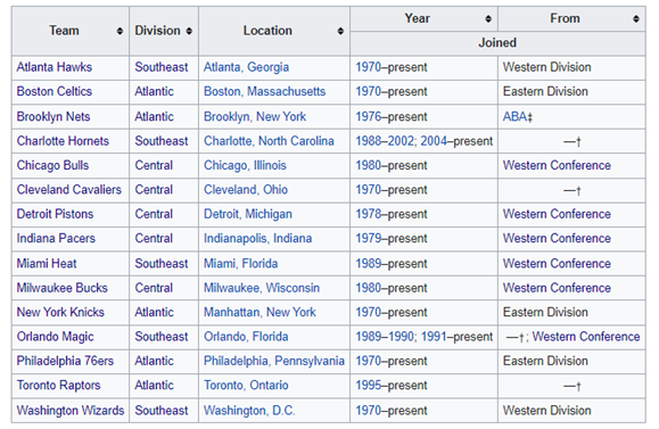
Eastern Conference Champions:
See also: NBA Conference Finals § Conference
List of Eastern Conference teams with the most conference championships:
- 9: Boston Celtics
- 6: Chicago Bulls
- 6: Miami Heat
- 5: Cleveland Cavaliers
- 5: Detroit Pistons
- 5: Philadelphia 76ers
- 4: Baltimore/Washington Bullets
- 4: New York Knicks
- 2: New Jersey Nets
- 2: Orlando Magic
- 1: Indiana Pacers
- 1: Milwaukee Bucks
- 1: Toronto Raptors
Atlantic Division of the Eastern NBA ConferencePictured below: Team Logos of Atlantic Division
The Atlantic Division is one of the three divisions in the Eastern Conference of the National Basketball Association (NBA).
The division consists of five teams:
All teams, except the Raptors, are located on the East Coast of the United States. However, Toronto sports teams have over the years enjoyed rivalries with teams in the Northeastern United States (particularly, Toronto teams also share divisions with Boston and New York teams in Major League Baseball and the National Hockey League.
The division was created at the start of the 1970–71 season, when the league expanded from 14 to 17 teams with the addition of the Buffalo Braves, the Cleveland Cavaliers and the Portland Trail Blazers. The league realigned itself into two conferences, the Western Conference and the Eastern Conference, with two divisions in each conference.
The Atlantic Division began with four inaugural members, the Celtics, the Braves, the Knicks and the 76ers. The Celtics, the Knicks and the 76ers all joined from the Eastern Division.
The Celtics have won the most Atlantic Division titles with 22. Nine NBA champions have come from the Atlantic Division. The Celtics have won six championships, while the Knicks, the 76ers and the Raptors have won one championship each. All of them, except the 1972–73 Knicks, were division champions.
In the 1983–84 season, all five teams from the division qualified for the playoffs. In the 1982–83 season, all teams in the division had winning percentages above 0.500 (50%).
2020-2021 Standings:
Main article: 2020–21 NBA season
The division consists of five teams:
- the Boston Celtics,
- the Brooklyn Nets,
- the New York Knicks,
- the Philadelphia 76ers
- and the Toronto Raptors.
All teams, except the Raptors, are located on the East Coast of the United States. However, Toronto sports teams have over the years enjoyed rivalries with teams in the Northeastern United States (particularly, Toronto teams also share divisions with Boston and New York teams in Major League Baseball and the National Hockey League.
The division was created at the start of the 1970–71 season, when the league expanded from 14 to 17 teams with the addition of the Buffalo Braves, the Cleveland Cavaliers and the Portland Trail Blazers. The league realigned itself into two conferences, the Western Conference and the Eastern Conference, with two divisions in each conference.
The Atlantic Division began with four inaugural members, the Celtics, the Braves, the Knicks and the 76ers. The Celtics, the Knicks and the 76ers all joined from the Eastern Division.
The Celtics have won the most Atlantic Division titles with 22. Nine NBA champions have come from the Atlantic Division. The Celtics have won six championships, while the Knicks, the 76ers and the Raptors have won one championship each. All of them, except the 1972–73 Knicks, were division champions.
In the 1983–84 season, all five teams from the division qualified for the playoffs. In the 1982–83 season, all teams in the division had winning percentages above 0.500 (50%).
2020-2021 Standings:
Main article: 2020–21 NBA season
Teams:
Click on any of the following blue hyperlinks for more about the Atlantic Division of the Eastern Conference:___________________________________________________________________________
The following five teams are current members of the Atlantic Division of the Eastern Conference:
Central Division (CD) of the Eastern Conference (EC) Pictured below: Team Logos of the Eastern Conference Central Division: (L-R): Cleveland Cavaliers, Chicago Bulls, Detroit Piston, Milwaukee Bucks, and Indiana Pacers
The Central Division is one of the three divisions in the Eastern Conference of the National Basketball Association (NBA). The division consists of five teams:
All teams, except the Cavaliers, are former Midwest Division teams, hence the Central Division now largely resembling the Midwest Division in the 1970s.
The division was created at the start of the 1970–71 season, when the league expanded from 14 to 17 teams with the addition of the Buffalo Braves, the Cleveland Cavaliers and the Portland Trail Blazers. The league realigned itself into two conferences, the Western Conference and the Eastern Conference, with two divisions each in each conference.
The Central Division began with four inaugural members, the Atlanta Hawks, the Baltimore Bullets, the Cincinnati Royals and the Cleveland Cavaliers. The Hawks joined from the Western Division, while the Bullets and the Royals joined from the Eastern Division.
The Bucks have won the most Central Division titles with ten. The Pistons have won the second most titles with nine. Thirteen NBA champions came from the Central Division: the Bulls won six championships, the Pistons won three championships, the Bucks won two championships, and the Bullets and Cavaliers won one championship each. All of them, except the 1977–78 Bullets and the 2003–04 Pistons, were division champions.
In the 2005–06 season, all five teams from the division qualified for the playoffs. The most recent division champions are the Milwaukee Bucks. The Central Division has the highest percentage of teams that have won a championship, with four out of five teams winning the championship, and the Pacers the only franchise never to have won.
The Central Division existed for one season in the 1949–50 season as one of the three divisions in the NBA, along with the Western and the Eastern Division. The current Central Division that was formed in the 1970, is one of the three divisions in the Eastern Conference.
Click on any of the following blue hyperlinks for more about the Central Division of the Eastern NBA Conference:
___________________________________________________________________________
All teams, except the Cavaliers, are former Midwest Division teams, hence the Central Division now largely resembling the Midwest Division in the 1970s.
The division was created at the start of the 1970–71 season, when the league expanded from 14 to 17 teams with the addition of the Buffalo Braves, the Cleveland Cavaliers and the Portland Trail Blazers. The league realigned itself into two conferences, the Western Conference and the Eastern Conference, with two divisions each in each conference.
The Central Division began with four inaugural members, the Atlanta Hawks, the Baltimore Bullets, the Cincinnati Royals and the Cleveland Cavaliers. The Hawks joined from the Western Division, while the Bullets and the Royals joined from the Eastern Division.
The Bucks have won the most Central Division titles with ten. The Pistons have won the second most titles with nine. Thirteen NBA champions came from the Central Division: the Bulls won six championships, the Pistons won three championships, the Bucks won two championships, and the Bullets and Cavaliers won one championship each. All of them, except the 1977–78 Bullets and the 2003–04 Pistons, were division champions.
In the 2005–06 season, all five teams from the division qualified for the playoffs. The most recent division champions are the Milwaukee Bucks. The Central Division has the highest percentage of teams that have won a championship, with four out of five teams winning the championship, and the Pacers the only franchise never to have won.
The Central Division existed for one season in the 1949–50 season as one of the three divisions in the NBA, along with the Western and the Eastern Division. The current Central Division that was formed in the 1970, is one of the three divisions in the Eastern Conference.
Click on any of the following blue hyperlinks for more about the Central Division of the Eastern NBA Conference:
___________________________________________________________________________
The following five NBA teams are current members of the NBA's Central Division of the Eastern Conference:
Larry Bird,Pictured below: Larry Bird drives to the basket for a layup against the Milwaukee Bucks during the 1980 NBA game at the Boston Garden. Photograph: Dick Raphael/NBAE/Getty Images
Larry Joe Bird (born December 7, 1956) is an American former professional basketball player, coach and executive in the National Basketball Association (NBA).
Nicknamed "the Hick from French Lick" and "Larry Legend," Bird is widely regarded as one of the greatest basketball players of all time. Growing up in French Lick, Indiana, he was a local basketball phenom. Highly recruited, he initially signed to play for coach Bobby Knight of the Indiana Hoosiers, but dropped out after one month and returned to French Lick to attend a local community college.
The next year he attended the smaller Indiana State University, playing ultimately for three years for the Sycamores. Drafted by the Boston Celtics with the sixth overall pick in the 1978 NBA draft after his second year at Indiana State, Bird elected to stay in college and play one more season. He then led his team to an undefeated regular season in 1978–1979.
The season finished with a national championship game matchup against Michigan State, a team that featured Magic Johnson, beginning a career-long rivalry that the two shared for more than a decade.
Bird entered the NBA for the 1979–1980 season, where he made an immediate impact, starting at power forward and leading the Celtics to a 32-win improvement over the previous season before being eliminated from the playoffs in the Conference Finals. He played for the Celtics during his entire professional career (13 seasons), leading them to five NBA finals appearances and three NBA championships.
Bird played most of his career with forward Kevin McHale and center Robert Parish, considered by some to be the greatest front court in NBA history. Bird was a 12-time NBA All-Star, won two NBA Finals MVP awards and received the NBA Most Valuable Player Award three consecutive times (1984–1986), making him the only forward in league history to do so.
Bird was also a member of the gold medal-winning 1992 United States men's Olympic basketball team known as "The Dream Team". He was voted to the NBA's 50th Anniversary All-Time Team in 1996, was inducted into the Naismith Memorial Basketball Hall of Fame in 1998, and was inducted into the Hall of Fame again in 2010 as a member of "The Dream Team".
In October 2021, as part of the NBA's 75th Anniversary, Bird was honored as one of the 75 greatest players of all time, by being named to the NBA's 75th Anniversary Team. A versatile player at both forward positions, he could play both inside and outside, being one of the first players in the league to take advantage of the newly adopted three-point line. Bird was rated the greatest NBA small forward of all time by Fox Sports in 2016. After retiring as a player, Bird served as head coach of the Indiana Pacers from 1997 to 2000.
Bird was named NBA Coach of the Year for the 1997–1998 season and later led the Pacers to a berth in the 2000 NBA Finals. In 2003, Bird was named president of basketball operations for the Pacers, holding the position until retiring in 2012. He was named NBA Executive of the Year for the 2012 season. Bird returned to the Pacers as president of basketball operations in 2013 and remained in that role until 2017.
Bird is the only person in NBA history to be named Rookie of the Year, Most Valuable Player, NBA Finals MVP, All-Star MVP, Coach of the Year, and Executive of the Year.
Click on any of the following blue hyperlinks for more about Larry Bird:
Nicknamed "the Hick from French Lick" and "Larry Legend," Bird is widely regarded as one of the greatest basketball players of all time. Growing up in French Lick, Indiana, he was a local basketball phenom. Highly recruited, he initially signed to play for coach Bobby Knight of the Indiana Hoosiers, but dropped out after one month and returned to French Lick to attend a local community college.
The next year he attended the smaller Indiana State University, playing ultimately for three years for the Sycamores. Drafted by the Boston Celtics with the sixth overall pick in the 1978 NBA draft after his second year at Indiana State, Bird elected to stay in college and play one more season. He then led his team to an undefeated regular season in 1978–1979.
The season finished with a national championship game matchup against Michigan State, a team that featured Magic Johnson, beginning a career-long rivalry that the two shared for more than a decade.
Bird entered the NBA for the 1979–1980 season, where he made an immediate impact, starting at power forward and leading the Celtics to a 32-win improvement over the previous season before being eliminated from the playoffs in the Conference Finals. He played for the Celtics during his entire professional career (13 seasons), leading them to five NBA finals appearances and three NBA championships.
Bird played most of his career with forward Kevin McHale and center Robert Parish, considered by some to be the greatest front court in NBA history. Bird was a 12-time NBA All-Star, won two NBA Finals MVP awards and received the NBA Most Valuable Player Award three consecutive times (1984–1986), making him the only forward in league history to do so.
Bird was also a member of the gold medal-winning 1992 United States men's Olympic basketball team known as "The Dream Team". He was voted to the NBA's 50th Anniversary All-Time Team in 1996, was inducted into the Naismith Memorial Basketball Hall of Fame in 1998, and was inducted into the Hall of Fame again in 2010 as a member of "The Dream Team".
In October 2021, as part of the NBA's 75th Anniversary, Bird was honored as one of the 75 greatest players of all time, by being named to the NBA's 75th Anniversary Team. A versatile player at both forward positions, he could play both inside and outside, being one of the first players in the league to take advantage of the newly adopted three-point line. Bird was rated the greatest NBA small forward of all time by Fox Sports in 2016. After retiring as a player, Bird served as head coach of the Indiana Pacers from 1997 to 2000.
Bird was named NBA Coach of the Year for the 1997–1998 season and later led the Pacers to a berth in the 2000 NBA Finals. In 2003, Bird was named president of basketball operations for the Pacers, holding the position until retiring in 2012. He was named NBA Executive of the Year for the 2012 season. Bird returned to the Pacers as president of basketball operations in 2013 and remained in that role until 2017.
Bird is the only person in NBA history to be named Rookie of the Year, Most Valuable Player, NBA Finals MVP, All-Star MVP, Coach of the Year, and Executive of the Year.
Click on any of the following blue hyperlinks for more about Larry Bird:
- Early life
- College career
- Professional career
- International play
- Player profile and legacy
- Career as coach and executive
- Awards and honors
- In popular culture
- Personal life
- Career statistics
- Head coaching record
- See also:
- Indiana Basketball Hall of Fame
- List of career achievements by Larry Bird
- "Saturday Morning Fun Pit", a 2013 episode of Futurama featuring Bird voice acting as a cartoon clone version of himself
- Career statistics and player information from NBA.com and Basketball-Reference.com
- Larry Bird at the Naismith Memorial Basketball Hall of Fame
- NBA profile
"Greatest of" Lists in Basketball (NBA and NCAA)
- YouTube Video: Top 15 NBA Career Point Leaders (1946-2020)
- YouTube Video: NBA Career Turnover Leaders (1979-2021)
- YouTube Video: NBA All-Time Playoff Points Leaders (1950-2019)
[Your WebHost: While there is no single Wikipedia Topic to cover all of the following "Greatest" basketball achievements, these have been compiled below for the more enthusiastic basketball fans]:
- List of National Basketball Association career assists leaders
- List of National Basketball Association career playoff assists leaders
- List of National Basketball Association career playoff free throw scoring leaders
- List of National Basketball Association career playoff rebounding leaders
- List of National Basketball Association career playoff scoring leaders
- List of National Basketball Association career playoff steals leaders
- List of National Basketball Association career playoff turnovers leaders
- List of National Basketball Association career scoring leaders
- List of National Basketball Association career steals leaders
- List of National Basketball Association career turnovers leaders
- List of National Basketball Association players with most points in a game
- List of National Basketball Association players with most steals in a game
- List of National Basketball Association annual minutes leaders
- List of NBA players who have spent their entire career with one franchise
- List of NCAA Division I men's basketball career scoring leaders
- List of NCAA Division I men's basketball players with 2000 points and 1000 rebounds
Mike Krzyzewski's greatness was never his system. It was his willingness to evolve.
- YouTube Video: Greatest College Coach EVER? How Mike Krzyzewski Became Coach K
- YouTube Video: Duke's Mike Krzyzewski Wants To Stay In The Moment With His Players
- YouTube Video: Top 10 Most Dramatic Coach K Wins (1/23/15)
DURHAM -- Duke men's basketball head coach Mike Krzyzewski, who has won more Division I men's college basketball games than any coach in history, announced Wednesday that the 2021-22 season will be his final year of coaching.
In 46 years as a head coach at Army West Point (1975-80) and Duke (1980-present), Krzyzewski amassed an NCAA-record 1,170 victories. In 41 seasons in Durham, he led Duke to five NCAA national championships — 1991, 1992, 2001, 2010 and 2015 — and 12 Final Fours.
HE'S NO. 1: Coach K is all-time leader in wins — here's the list
"My family and I view today as a celebration," said Krzyzewski. "Our time at both West Point and Duke has been beyond amazing and we are thankful and honored to have led two college programs at world-class institutions for more than four decades. That, coupled with 11 unforgettable years as the United States National Team coach, has resulted in a remarkable journey.
Certainly, I have been blessed to coach some of the finest young men and greatest players in basketball history as a direct result of these unique opportunities. For us, there is no greater joy than being part of our players' respective endeavors through basketball, and more importantly, their lives off the court. Our family is eternally grateful to everyone who contributed to our career for the past 46 years. So, to the countless members of our extended family, thank you very much."
"I can say without hesitation that Mike Krzyzewski is the greatest coach in the history of men's college basketball," said Duke President Vincent E. Price. "This is clearly demonstrated by his tremendous success at Duke — 1,170 career wins, five national championships, 15 ACC tournament and 12 ACC regular season titles — and his service to our country as the head coach of USA Basketball.
But the true measure of his excellence is more personal. It is in his resolute commitment to integrity, fairness, and inclusion; in his transformational impact on collegiate athletics and the Durham community; in the joy, generosity, and inspiration he has brought to countless fans; and in his role as guide and teacher of thousands of players, coaches, and staff at Duke and beyond. Mike, Mickie and the entire Krzyzewski family have been devoted to Duke for more than 40 years, and we are so grateful that relationship will continue for a long time to come."
"Simply put, Mike Krzyzewski's legacy — never to be repeated again — is truly mindboggling," said Duke Vice President and Director of Athletics Kevin White. "To suggest that Mike has more than earned the 'GOAT' mantle within the coaching community, both domestically and globally, is perhaps the greatest understatement of all time. Well beyond all the banners, hardware, titles, awards, honors, etc., Mike will long be best remembered, if not deeply respected and admired, for his unabashed love and utter devotion to his players.
Again, the consummate teacher, coach, and mentor, coupled with his highly unique curriculum around life lessons and service will surely live at the pinnacle level of his chosen profession in perpetuity."
Click here to read the complete article.
___________________________________________________________________________
Mike Krzyzewski (Wikipedia)
Michael William Krzyzewski (nicknamed "Coach K"; born February 13, 1947) is an American college basketball coach. He has served as the head coach at Duke University since 1980, where he has led the Blue Devils to five national titles, 12 Final Fours, 15 ACC tournament championships, and 13 ACC regular season titles. Among men's college basketball coaches, only UCLA's John Wooden has won more NCAA championships, with a total of ten. Krzyzewski is widely regarded as one of the best college basketball coaches of all time.
Krzyzewski has also coached the United States national team, which he has led to three gold medals at the 2008, 2012, and 2016 Olympics. He was the head coach of the U.S. team that won gold medals at the 2010 and the 2014 FIBA World Cup, and an assistant coach for the "Dream Team" at the 1992 Olympics.
Krzyzewski was a point guard at Army from 1966 to 1969 under coach Bob Knight. From 1975 to 1980, he was the head coach for his alma mater. He is a two-time inductee into the Naismith Memorial Basketball Hall of Fame, in 2001 for his individual coaching career and in 2010 as part of the collective induction of the "Dream Team." He was inducted into the College Basketball Hall of Fame in 2006, and the United States Olympic Hall of Fame in 2009 (with the "Dream Team").
On November 15, 2011, Krzyzewski led Duke to a 74–69 victory over Michigan State at Madison Square Garden to become the coach with the most wins in NCAA Division I men's basketball history.
Krzyzewski's 903rd victory set a new record, breaking that held by his former coach, Bob Knight. On January 25, 2015, Duke defeated St. John's, 77–68, again at Madison Square Garden, as Krzyzewski became the first Division I men's coach to reach 1,000 wins. On June 2, 2021, Krzyzewski announced that he would retire at the conclusion of the 2021–22 season.
Click on any of the following blue hyperlinks for more about Mike Krzyzewski:
In 46 years as a head coach at Army West Point (1975-80) and Duke (1980-present), Krzyzewski amassed an NCAA-record 1,170 victories. In 41 seasons in Durham, he led Duke to five NCAA national championships — 1991, 1992, 2001, 2010 and 2015 — and 12 Final Fours.
HE'S NO. 1: Coach K is all-time leader in wins — here's the list
"My family and I view today as a celebration," said Krzyzewski. "Our time at both West Point and Duke has been beyond amazing and we are thankful and honored to have led two college programs at world-class institutions for more than four decades. That, coupled with 11 unforgettable years as the United States National Team coach, has resulted in a remarkable journey.
Certainly, I have been blessed to coach some of the finest young men and greatest players in basketball history as a direct result of these unique opportunities. For us, there is no greater joy than being part of our players' respective endeavors through basketball, and more importantly, their lives off the court. Our family is eternally grateful to everyone who contributed to our career for the past 46 years. So, to the countless members of our extended family, thank you very much."
"I can say without hesitation that Mike Krzyzewski is the greatest coach in the history of men's college basketball," said Duke President Vincent E. Price. "This is clearly demonstrated by his tremendous success at Duke — 1,170 career wins, five national championships, 15 ACC tournament and 12 ACC regular season titles — and his service to our country as the head coach of USA Basketball.
But the true measure of his excellence is more personal. It is in his resolute commitment to integrity, fairness, and inclusion; in his transformational impact on collegiate athletics and the Durham community; in the joy, generosity, and inspiration he has brought to countless fans; and in his role as guide and teacher of thousands of players, coaches, and staff at Duke and beyond. Mike, Mickie and the entire Krzyzewski family have been devoted to Duke for more than 40 years, and we are so grateful that relationship will continue for a long time to come."
"Simply put, Mike Krzyzewski's legacy — never to be repeated again — is truly mindboggling," said Duke Vice President and Director of Athletics Kevin White. "To suggest that Mike has more than earned the 'GOAT' mantle within the coaching community, both domestically and globally, is perhaps the greatest understatement of all time. Well beyond all the banners, hardware, titles, awards, honors, etc., Mike will long be best remembered, if not deeply respected and admired, for his unabashed love and utter devotion to his players.
Again, the consummate teacher, coach, and mentor, coupled with his highly unique curriculum around life lessons and service will surely live at the pinnacle level of his chosen profession in perpetuity."
Click here to read the complete article.
___________________________________________________________________________
Mike Krzyzewski (Wikipedia)
Michael William Krzyzewski (nicknamed "Coach K"; born February 13, 1947) is an American college basketball coach. He has served as the head coach at Duke University since 1980, where he has led the Blue Devils to five national titles, 12 Final Fours, 15 ACC tournament championships, and 13 ACC regular season titles. Among men's college basketball coaches, only UCLA's John Wooden has won more NCAA championships, with a total of ten. Krzyzewski is widely regarded as one of the best college basketball coaches of all time.
Krzyzewski has also coached the United States national team, which he has led to three gold medals at the 2008, 2012, and 2016 Olympics. He was the head coach of the U.S. team that won gold medals at the 2010 and the 2014 FIBA World Cup, and an assistant coach for the "Dream Team" at the 1992 Olympics.
Krzyzewski was a point guard at Army from 1966 to 1969 under coach Bob Knight. From 1975 to 1980, he was the head coach for his alma mater. He is a two-time inductee into the Naismith Memorial Basketball Hall of Fame, in 2001 for his individual coaching career and in 2010 as part of the collective induction of the "Dream Team." He was inducted into the College Basketball Hall of Fame in 2006, and the United States Olympic Hall of Fame in 2009 (with the "Dream Team").
On November 15, 2011, Krzyzewski led Duke to a 74–69 victory over Michigan State at Madison Square Garden to become the coach with the most wins in NCAA Division I men's basketball history.
Krzyzewski's 903rd victory set a new record, breaking that held by his former coach, Bob Knight. On January 25, 2015, Duke defeated St. John's, 77–68, again at Madison Square Garden, as Krzyzewski became the first Division I men's coach to reach 1,000 wins. On June 2, 2021, Krzyzewski announced that he would retire at the conclusion of the 2021–22 season.
Click on any of the following blue hyperlinks for more about Mike Krzyzewski:
- Early life
- Coaching career
- Awards and honors
- Family and charity
- Head coaching record
- Coaching tree
- See also:
- FIBA Basketball World Cup winning head coaches
- List of college men's basketball coaches with 600 wins
- List of FIBA AmeriCup winning head coaches
- List of NCAA Division I Men's Basketball Tournament Final Four appearances by coach
- NCAA Division I Men's Basketball Tournament consecutive appearances
- Poles in Chicago
